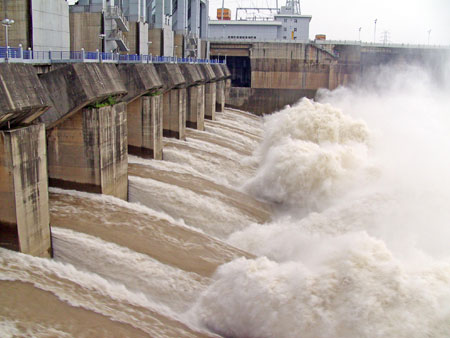
The Gezhouba dam in Yichang, central China's Hubei province.
|
 |
|
The Gezhouba dam in Yichang, central China's Hubei province. |
"Overseas markets will account for 50 percent of our business in the next three years, from the current 36 percent, boosted by massive projects in Africa, the Middle East and Central Asia regions," Yang said.
The group now has 44 overseas projects - mostly hydroelectric-power related - in 17 countries or regions, according to Yang.
The State-owned infrastructure company, based in Central China's Hubei province, last month signed a 4.97 billion yuan ($727.78 million) contract with a Kazakhstan company to set up a hydroelectric-power plant in that country. The contract with Kazakhstan Natural Gas Technology Co Ltd would allow it to construct a 254-megawatt hydroelectric-power station on the banks of the Chilik River in Alma-Ata, Kazakhstan.
The volume of Gezhouba's overseas business ventures is much higher than its larger rivals - the average of which is 20 percent - mainly because as a leading builder of hydroelectric projects, Gezhouba has a limited market at home compared with its larger rivals which are more experienced in other infrastructure construction, industry analysts said.
"As the main contractor for China's Three Gorges Dam, Gezhouba is very experienced and advanced in hydroelectric projects, which afforded the builder many opportunities in the market, said Li Zhirui, an industry analyst with First Capital Securities. "China's construction contractors, as a whole, have big advantages because of their low labor costs in the global construction market."
However, they have a smaller market share in more mature markets including the US and Europe, Li said.
Yang estimated that the group would secure 50 billion yuan in new orders in 2010, with 20 billion yuan from foreign markets and 30 billion yuan from the domestic market.
The builder said new orders secured in January this year increased by 40 percent compared with the same period in 2009.
Gezhouba signed 42 billion yuan in new orders in 2009.
"The impact of China's 4 trillion yuan stimulus package on the infrastructure sector will fade out in the years to come, resulting in less investment in public construction work and forcing domestic contractors to tap developing markets," Li from First Capital said.
In the meantime, the company, primarily engaged in the construction of power plants, dams, roads, bridges and civil engineering projects, is also diversifying its business by increasing its cement output to 20 million tons in 2010, which, according to Yang, would generate 4 billion yuan in revenue this year.